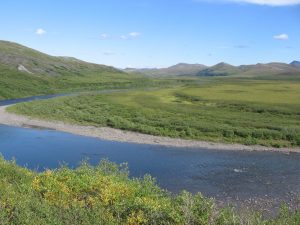Instructors:
Ellen Wohl, Lectures
Office NR 330 (9-10 T/Th, by appt.)
Sarah Hinshaw, Laboratory
Office NR 317 (10-11M,10-11W, by appt.)
Text: Key Concepts in Geomorphology, Bierman & Montgomery, 2013
Grading:
| Midterm | 20% |
| Final Exam | 25% |
| Labs | 25% |
| Lab Exam | 15% |
| Final project | 15% |
There will be 4 fieldtrips during lab. These are required, and will involve field exercises and written reports, which will equal one lab exercise. You will be required to do a field-oriented project; see handout on Term Paper Assignment. Completion of this project is required in order to pass the course. Exams will be in-class essay and short-answer questions. I expect you to read assignments in the text, and the relevant sections of the lecture notes, before coming to class. Because the class meets only twice a week, but is worth 4 credit hours, class discussions will largely build on outside readings, rather than repeating the same material.
Learning Objectives:
- To practice scientific method by posing and testing a hypothesis, collecting and interpreting data, and writing a summary scientific report.
- To become knowledgeable about diverse surficial geologic processes and landforms.
Academic Integrity:
Copying and plagiarism are strictly prohibited at CSU and constitute academic misconduct. See information on Academic Integrity/Misconduct and honor pledge at CSU: http://catalog.colostate.edu/general-catalog/policies/students-responsibilities/#academic-integrity. Plagiarism on the final project report, which includes copying datasets which are not your own, will result in automatic failure of the entire course. A late final project will be penalized 10% if it is one day late, and 20% if it is two days late. After two days, it will receive a zero grade, but the student can turn in the report before the last week of class in order to avoid the automatic failure for not completing the final project. Please refer to the lab syllabus for information on late policies regarding lab assignments.
Accommodations:
I want this to be a successful classroom experience for you. If you have a documented disability or any other needs and wish to discuss academic accommodations, please contact me as soon as possible. Necessary academic accommodations will be made based on the recommendations received from Resources for Disabled Students. You must be registered with Resources for Disabled Students to receive disability accommodations.
CSU’s non-discrimination statement:
Colorado State University does not discriminate on the basis of race, age, creed, color, religion, national origin or ancestry, sex, gender, disability, veteran status, genetic information, sexual orientation, gender identity or expression, or pregnancy. The University complies with the Civil Rights Act of 1964, as amended, related Executive Orders 11246 and 11375, Title IX of the Education Amendments Act of 1972, Sections 503 and 504 of the Rehabilitation Act of 1973, Section 402 of the Vietnam Era Veterans’ Readjustment Assistance Act of 1974, as amended, the Age Discrimination in Employment Act of 1967, as amended, The Pregnancy Discrimination Act of 1978, Americans with Disabilities Act of 1990, the Civil Rights Act of 1991, the ADA Amendments Act of 2008, the Genetic Information Nondiscrimination Act of 2008, and all civil rights laws of the State of Colorado. Accordingly, equal opportunity of employment and admission shall be extended to all persons. The University shall promote equal opportunity and treatment in employment through a positive and continuing affirmative action program for ethnic minorities, women, persons with disabilities, and veterans.
Title IX Syllabus/Course information:
COURSE CONTENT NOTE: CSU’s Student Sexual Harassment and Violence policy, following national guidance from the Office of Civil Rights, requires that faculty follow CSU policy as a “mandatory reporter” of any personal disclosure of sexual harassment, abuse, and/or violence related experiences or incidents shared with the faculty member in person, via email, and/or in classroom papers or homework exercises. These disclosures include but are not limited to reports of personal relational abuse, relational/domestic violence, and stalking. While faculty are often able to help students locate appropriate channels of assistance on campus (e.g., see the CSU Health Network link below), disclosure by the student to the faculty member requires that the faculty member inform appropriate CSU channels to help ensure that the student’s safety and welfare is being addressed, even if the student requests that the disclosure not be shared.
For counseling support and assistance, please see the CSU Health Network, which includes a variety of counseling services that can be accessed at: http://www.health.colostate.edu/. And, the Sexual Assault Victim Assistance Team is a confidential resource for students that does not have a reporting requirement and that can be of great help to students who have experienced sexual assault. The web address is http://www.wgac.colostate.edu/need-help-support
Library & Research Help:
The CSU Libraries Help Desk provides research and technical assistance either in person at Morgan Library or by phone at 970-491-1841. Jocelyn Boice is the librarian supporting this course. Contact her by email at jocelyn.boice@colostate.edu or by phone at 970-491-3882 to ask questions or set up an appointment for in-depth research help.

